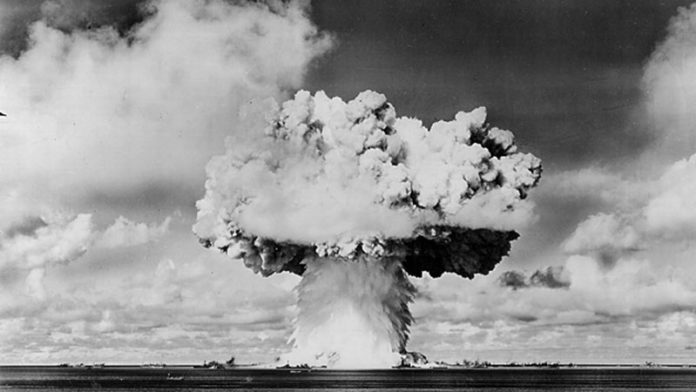Marking the 74th anniversary of the atomic bombings of Hiroshima and Nagasaki, the first and only times nuclear weapons have been used in combat, an expert stressed that the risk of the use of nuclear weapons a second time may only be reduced if superpowers such as the U.S. and Russia remain loyal to the rules and norms set by the Nuclear Non-Proliferation Treaty (NPT).
The atomic bombs killed hundreds of thousands of people in Japan when U.S. forces detonated them to end World War II.
Dr. Sebnem Udum, associate professor at the Department of International Relations of Hacettepe University in capital Ankara, said the main thing that increases the risk of a nuclear war in today’s world is the negative impact of recent developments in the international nuclear nonproliferation regime, whose cornerstone is the Nuclear Nonproliferation Treaty of 1970.
Nuclear nonproliferation regime determines the behavior of the parties to the treaty beyond their national interests and ensures the implementation of the rules on nuclear disarmament, said Udum.
Udum stressed the importance of preserving and strengthening the existing regime and norms for the non-proliferation of nuclear weapons.
Risk of nuclear war now highest since WW2
The Stockholm International Peace Research Institute (SIPRI) announced in its annual report on June 17 that nine countries currently possess an estimated 13,865 nuclear weapons, 600 less than 2018 figures.
“The risks of nuclear war are particularly high now, and the risks of the use of nuclear weapons are higher now than at any time since World War II,” Renata Dwan, director of the United Nations Institute for Disarmament Research (UNIDIR), told reporters on May 21, warning the world about the danger of nuclear weapons.
Risks of a new arms race have significantly risen after the U.S.’s withdrawal from the Intermediate-Range Nuclear Forces (INF) Treaty, Russian Deputy Foreign Minister Sergey Ryabkov said on Aug. 5.
On Aug. 2, the U.S. formally withdrew from the INF Treaty following a months-long war of words between Moscow and Washington.
The treaty was signed on Dec. 8, 1987 after about 10 years of negotiations by then-Soviet leader Mikhail Gorbachev and then-U.S. President Ronald Reagan, bringing to an end the threat of a nuclear war in Europe.
The prolongation of the last “pillar”, the START Treaty, is currently under question as the U.S. links it with the INF Treaty.
Udum said UN mechanisms will remain inadequate as long as the states that should contribute to the solution do not fulfill their responsibilities.
U.S. not acting in accordance with spirit of NPT
Udum highlighted that Article III and IV of the NPT regulate “use of nuclear energy for peaceful purposes” in detail while article VI states that “each of the Parties to the Treaty undertakes to pursue negotiations in good faith on effective measures relating to cessation of the nuclear arms race at an early date and to nuclear disarmament”.
Recalling the United States’ commitments under Article VI, Udum said: ”The U.S. is not acting in accordance with the spirit of the treaty.”
“The existence of nuclear weapons is the most important part of the deterrence strategies of nuclear weapon states.
“I do not foresee a complete and irreversible disarmament for the near future,” she added.
She highlighted the U.S. withdrawal from the Iran nuclear deal and North Korean politics as two important factors that further deepened the nuclear escalation and negatively affected the future of the NPT regime.
The Iran nuclear accord, also known as the Joint Comprehensive Plan of Action (JCPOA), was signed in 2015 between Iran and Russia, China, France, the U.K. and the U.S. plus Germany.
Last year, however, U.S. President Donald Trump unilaterally withdrew from the deal and intensified pressure on Tehran by re-imposing sanctions targeting the country’s energy and banking sectors.
Under the agreement, the world’s major powers promised to lift economic sanctions imposed on Iran in return for Tehran agreeing to limit its nuclear activity to peaceful and civilian purposes.
In June, Iran sharply criticized world powers for not fulfilling their promises and threatened to abandon parts of the deal.
North Korea’s denuclearization
The UN Security Council met after North Korea’s latest missile launch on Aug.1.
Britain, France and Germany urged Pyongyang to hold meaningful talks with the U.S. on its missile programs.
North Korea’s state media previously cautioned that its recent launches were a warning to South Korea ahead of this month’s military drills with the United States.
While the U.S. has played down the significance of Pyongyang’s short-range projectiles, the North is barred from testing ballistic missiles under UN Security Council resolutions.
The functioning and effectiveness of personal diplomacy between country leaders, a new trend that has emerged in recent years, has also been central to efforts in the field of nuclear non-proliferation, according to Udum.
Even though Pyongyang holds talks with the U.S. on its missile programs, there have not been any significant developments in North Korea’s denuclearization, she said.
Middle powers should have an important role in preventing the proliferation of nuclear weapons, she added.
On Turkey’s contribution to disarmament efforts, Udum said that Turkey is a member of the Non-Proliferation and Disarmament Initiative (NPDI) and played an active role in establishing a region free of weapons of mass destruction in the Middle East.
The NPDI is a group of 12 non-nuclear weapon states which Japan and Australia initiated in 2010 to lead international efforts in nuclear disarmament.



















































